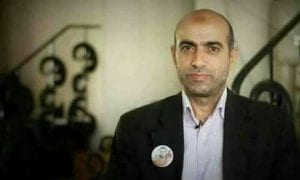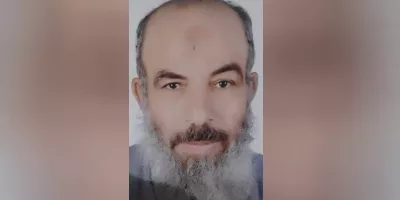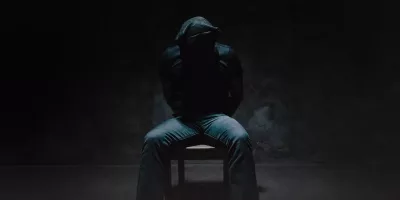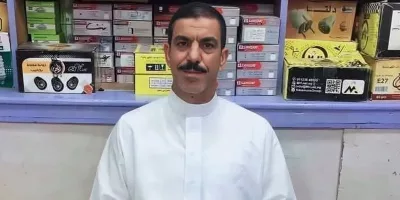Geneva: 2 October 2017
Egypt project: Detention Watch
Ibrahim Abdel Moneim Metwally Hijazi was arrested and detained at the National Security Premises in Abbassia, Cairo Governorate where he was subjected to torture for 2 days. He was arrested owing to his work with the “Association of the Families of Enforced Disappearance Victims” as well as communicating with the United Nations’ Working Group on Enforced Disappearance. He is currently held in solitary confinement in Tora Maximum Security Prison two. He is not allowed any contact with the outside world, and his family fears that he is still subjected to torture.
Mr. Hijazi is 53 years old and works as a lawyer. He is the founder and coordinator of the Association of the Families of Enforced Disappearance Victims. He began his work after the enforced disappearance of his own son, Amr. Amr was in the last year in Engineering School when he was arrested from a protest in “Altayaran” Street, near the House of the Republican Guards in Nasr City. The arrest took place in 2013, and has not been seen since then.
On 10 September 2017, National Security Agents (previously known as State Security) arrested Mr. Hijazi at 8 a.m. from Cairo International Airport, while he was on his way to Geneva, Switzerland through Egypt Air Flight MS 771. He was detained in the National Security Office in the airport until 8 p.m. after which he was transferred to National Security Premises in Abbassia in Cairo Governorate and remained there until the 12th of September 2017.
During his detention in National Security Premises in Abbassia, he was subjected to torture with the aim of extracting information about his work with the families of enforced disappearance victims in Egypt, his contact with the United Nations’ Working Group on Enforced Disappearance as well as to punish him for it and get him to confess to it. He was threatened, stripped of all of his clothes, and given electric shocks all over his body. In addition, he was sprayed with water, his hands tied behind his back and was severely beaten. According to Mr. Hijazi, his lawyer and family, National Security Agents tortured him since his arrival and until he left on the12th of September 2017. Any more specific details of the methods of the torture are unavailable as the family and lawyer have not been allowed to speak to Mr. Hijazi later.
Mr. Hijazi was accused of forming an organization against the law (referring to the Association of the Families of Enforced Disappearance Victims), communicating with foreign entities (in reference to the United Nations’ Working Group on Enforced Disappearance), spreading false news that Egypt has enforced disappearance victims and inciting international organizations against Egypt. Mr. Hijazi admitted working with the families of victims and the Working Group; however, it is impossible to know if there are other charges filed against him, and what exactly he admitted doing during the investigations. The lawyer and Mr. Hijazi are not allowed to view the official papers and do not know the actual charges against him. During his appearance before the prosecution, Mr. Hijazi was made to sign some papers without being allowed to read what was written inside.
Since the 12th of September 2017 and till today, Mr. Hijazi has been imprisoned in Tora Maximum Security Prison two (Scorpion Prison) in solitary confinement. When he arrived, he was placed in a solitary confinement cell that is small, without any source of lighting and filled with water from an unknown source. There is no bed for him to sleep on, and the prison administration took his personal clothes. They serve him food in one plate, but due to the darkness, he can’t see the food or assess its quality. Thus, he does not eat it.
Mr. Hijazi was not examined by a doctor at any point during or after his ordeal and did not receive treatment for injuries sustained as a result of the torture.
Since his arrest, his family and lawyer have not been allowed to visit or talk to him. The family has also not been allowed inside the prosecution to see him during his hearing. Apart from seeing him in the High State Security Prosecution, the lawyer is not allowed to see him elsewhere and doesn’t speak with him at all. On 25 September 2017, the prison administration of Tora Maximum Security Prison two did not permit the family to visit. The family waited for a visit for six hours before being told to leave and that there are no visits for them by a Prison Officer.
On 12 September 2017, during his appearance before the High State Security Prosecution, Mr. Hijazi informed the prosecutor, and subsequently his lawyer who was present, of the torture he was subjected to in National Security Premises in Abbassia. On 20 September 2017, Mr. Hijazi informed the prosecutor of his detention conditions. On 20 September 2017, his lawyer also filed a complaint to the High State Security Prosecution about the torture his client was subjected to, but no investigation or questioning was undertaken by the prosecution. On 26 September 2017, the family sent telegraphs – under number 4062 – to Prison Affairs, Minister of Interior and the Egyptian National Human Rights Commission protesting their prevention from visiting their relative. They also submitted a complaint to the General Prosecutor under number 110211/2017. They received no response since then.
His family has no way of learning what is happening with him now in solitary confinement and fear that he might be taken back to the National Security Premises in Abbassia for further interrogations that might result in more torture.
By torturing, imprisoning Mr. Hijazi in prolonged solitary confinement and not conducting a prompt investigation, the Egyptian state authorities are violating Egypt’s constitution and international law and standards. Article 52 of the Egyptian constitution of 2014 declares torture in all its forms a crime not subject to prescription. Article 12 of the Convention against Torture, to which Egypt is a party, states that “[states] shall ensure that its competent authorities proceed to a prompt and impartial investigation, wherever there is reasonable ground to believe that an act of torture has been committed.” In its General Comment No.20, the UN’s Human Rights Committee interdating article 7 of the ICCPR on prohibition of torture, which Egypt ratified, notes that “prolonged solitary confinement of the detained or imprisoned person may amount to acts prohibited by article 7.”
Committee for Justice calls upon relevant Egyptian authorities to release Mr. Hijazi from solitary confinement, provide him with treatment for injuries sustained as a result of the torture and allow is family and lawyer to visit him.
We also demand that High State Security Prosecution investigates the torture allegations mentioned in this press release and prosecute the perpetrators accordingly. They must also safeguard his right to a fair trial by allowing him to speak with his lawyer and inform him of all the charges and evidence against him.





